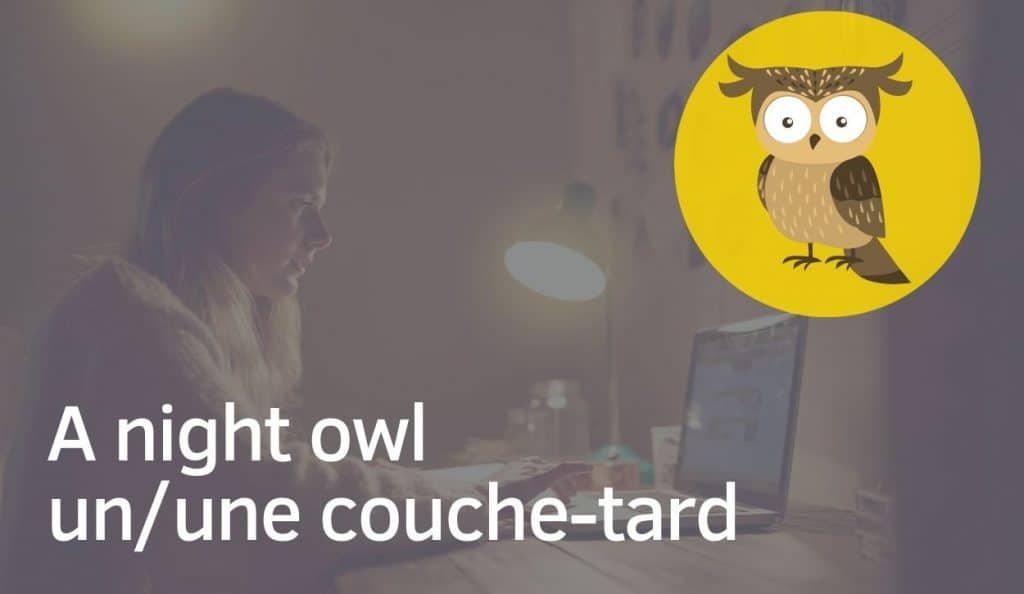Good Night in French and Its Best Alternatives
Updated: 28 March, 2021 by Mylene in French Expressions ▪

Saying good night is a common way to wish a peaceful sleep to a friend, a family member, or just someone you met outside. There are several distinct ways to say good night in French. Each expression has a unique meaning that defines when it’s appropriate to say it, with whom, and how? This post provides the most common ways of telling someone to sleep well. There are different ways to say good night in the French language and among them, you’ll learn:
- How to say good night in French?
- The difference between bonne nuit and bonsoir
- How to say I’m going to sleep in French?
- How to say have a good night for children?
- How to say I’m going to bed in French?
- How to say a night owl in French?
- What to respond to a good night?
- Expressions with words sommeil and dormir
- Sleep-related french expressions
How to say good night in French?
Good night in French is bonne nuit. It’s the most simple nighttime farewell.
What does bonne nuit mean?
It is clear that there are two distinct words: bonne and nuit.
- bonne in French is used instead of “bon”. Bonne means good but as the word nuit is feminine therefore the adjective bon switches to its feminine form “bonne“.
- nuit means the night time in French.
When to use bonne nuit?
By saying bonne nuit you’re wishing the other person(s) a nice night.
You need to use it only if you’re around people that you know personally as it’s a personal thing.
Use this French expression to wish a good night upon leaving. You need to say it just before going to bed.
How to use bonne nuit in French?
You don’t need to add something after bonne nuit. You can just say:
- bonne nuit: good night.
- bonne nuit + noun such as bonne nuit Marie: good night Marie.
- bonne nuit tout le monde: good night everyone.
- bonne nuit à tous: good night everyone.
Everyone can reply as well “bonne nuit” to wish you a good night as well. For example:
- You: Il est l’heure d’aller dormir, bonne nuit à tous (It’s time to go to sleep, good night everyone!)
- Everyone: Bonne nuit!

The difference between bonne nuit and bonsoir
What does bonsoir mean?
Bonsoir is a French greeting composed of two words bon and soir:
- bon in French means good.
- soir means evening in French.
When to use bonsoir?
Bonsoir is the equivalent of bonjour but used at night, after 6 pm! It is a polite French greeting word.
What’s the difference between bonne nuit and bonsoir in French?
One major difference between bonsoir and bonne nuit is that bonsoir can also be used to say goodbye. Bonne nuit is what you would say to someone before going to sleep. This means that you can use bonsoir when you meet someone (evening hours), and at the same time, you can use bonsoir upon leaving (again not during the day).
Bonsoir is a French greeting and it’s one of the first words to learn. Check out our article on how to say goodbye in French. You’ll discover the different alternatives when saying Goodbye in French.
When not to use bonne nuit in French?
If you’re simply wishing goodbye to someone in the evening and they’re not going to bed straight away, you have to use bonne soirée or bonsoir.
This means that if you’re not going to bed straight away it would be inappropriate to use bonne nuit.
If you’re wishing someone a good night out on the town you’d say “bonne soirée”, which also translates to “have a good evening”.
How to say I’m going to sleep in French?
Je vais dormir is the best way to say in French I’m going to sleep.
It’s an informal way to say you’re tired and you’re going to sleep.
This sentence is composed of three words:
- je vais means I’m going to
- dormir means to sleep
How to say have a good night for children?
To put children to bed, parents will use one of the following phrases:
- il est l’heure d’aller au lit: it’s time to go to bed.
- il est tard, il faut faire dodo: it’s late, it’s time for beddy-byes!
Faire dodo means to go to bed.
This sentence is used by children and when speaking to children.
Besides, it’s not uncommon to hear adults use it.
- Ma fille fait dodo à 20 heures: My daughter goes night-night at 8.

How to say I’m going to bed in French?
Je vais me coucher is a common way to say in French I’m going to bed.
It’s another unfamiliar way to say good night.
Se coucher is a reflexive verb and means putting myself to bed.
Generally, people will reply to you “bonne nuit” which means have a good night.
- Je me couche à 23 heures: I go to bed at 11 pm.
How to say a night owl in French?
Night owl person in French translates to couche-tard.
While a couche-tard (night owl) is a person who tends to stay up until late at night, lève-tôt (early bird) is the word used to refer to someone who tends to wake up early in the morning.
Couche-tard is identical when used with masculine (un couche-tard) and feminine (une couche-tard).
You can say un couche-tard for masculine and une couche-tard Here is a sentence that includes night owl in French:
- Est-ce que vous êtes un couche-tard ou un lève-tôt? : Are you a night owl or a morning person?
As for the plural, it’s also written without the French plural -s: des couche-tard.
- L’option mode sombre de nombreuses applications mobile, ou mode nuit, permet aux couche-tard d’éviter d’être éblouis en pleine nuit: The dark mode option of many mobile applications allows night owls to avoid being dazzled by glare at night.

What you can respond when someone wishes you a good night?
Let’s see what you can use to reply to someone wishing you a good night. Here are a few options:
- dors bien: sleep well!
- dormez bien: plural form (sleep well!)
- fais de beaux rêves: means sweet dreams and literally translates to make some beautiful dreams! This is usually used to tell younger people like your kid.
- faites de beaux rêves: if you’re speaking to multiples persons such as the kids you would use this sentence.
- je te/vous souhaite une bonne nuit de sommeil: Sleep well!
A visual summary of nighttime Expressions in French
The image below summarizes the numerous nighttime expressions in French.
To revisit some of the most popular expressions, check our guide to common French expressions.

Related expressions with the word sommeil
Avoir sommeil
- J’ai sommeil: I’m sleepy
Avoir le sommeil léger
- J’ai le sommeil léger: I’m a light sleeper
Avoir le sommeil lourd
- J’ai le sommeil lourd: I’m a heavy sleeper
Avoir le sommeil agité
- J’ai le sommeil agité: I am a restless sleeper
Related expressions with the word dormir
Bien dormir
- Je dors bien: I sleep well
And its opposite
- Je dors mal: I sleep poorly
When you’re too tired, you can say:
- Je dors debout: I’m asleep on my feet
You can use one of the following phrases to speak about your sleep and to say you sleep very well:
- je dors comme un bébé: I sleep like a baby
- dormir comme un loir: sleep like a dormouse
- dormir comme un ange: sleep like an angel
- dormir comme un marmotte: sleep like a groundhog
Sleep-related French Expressions
Etre dans les bras de Morphée
When going to sleep young adults sometimes say:
- Je vais dans les bras de Morphée
Morphée, in Greco-Roman mythology, is one of the sons of Hypnos. Hypnos is the god of sleep. Morpheus sends human shapes of all kinds to the dreamer. For example:
- Il dort encore, il est dans les bras de Morphée: he’s still sleeping, he’s in the arms of Morpheus.
Le marchand de sable
Le marchand de sable is called the Sandman in English because it’s in reference to the Sandman of European tale who sprinkles sand to give good dreams to people sleeping.
- Le marchand means the merchant.
- Le sable means the sand.
Compter les moutons
Counting sheep is a mental exercise used as a means of putting oneself to sleep.
In most cases, people envision an endless series of identical white sheep jumping over a fence while counting them slowly as they do so.

And before turning the lights off!
I hope you learned new expressions and terms related to sleep and night vocabulary.
Discovering new expressions and building your vocabulary is important when learning French.
Helping online learners and students and setting them up for success is essential at Master Your French. Become a member!
To stay up to date on the latest French learning materials, connect with Master Your French on social media. You can follow us on Instagram @masteryourfrench, Twitter @myourfrench, and YouTube Master Your French channel.

